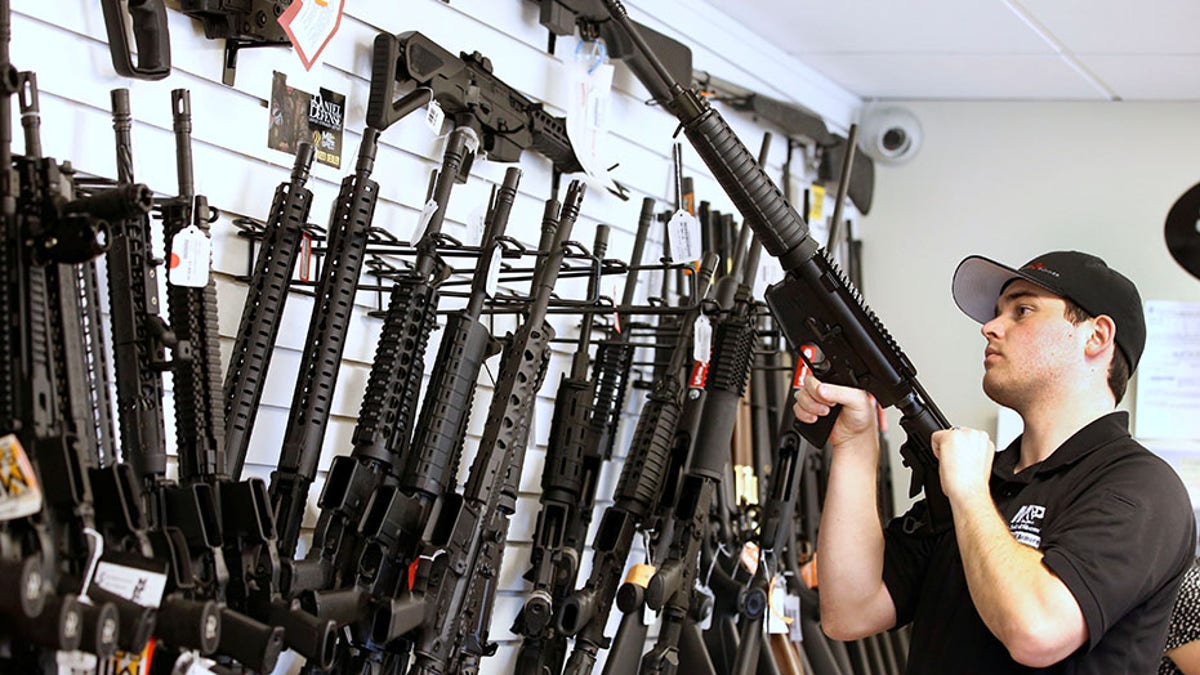
Alabama circled with red marker on map. Close up shot. (iStock)
Red Alabama is the best state for the firearms industry when it comes to factors such as jobs and gun culture, while blue Rhode Island is the worst, according to the jobs website Zippia.
The rankings reflect the sharp regional and political divide in the country on guns.
“A general rule of thumb emerged from the data — head south if you are looking to get one of as many as 141,500 jobs generated by companies that make, distribute, and sell guns,” the website said. The advice to head south also pertained to another 159,623 jobs in ancillary industries such as gun component suppliers.
But another “rule of thumb” is also apparent: If you want a job in the gun industry, head into Trump country. Each of the study’s top ten states - Alabama, Arkansas, Georgia, Idaho, Arizona, Florida, Indiana, Alaska, Missouri, and Louisiana - went for President Trump in the 2016 presidential election, most of them decisively. Of the ten worst states for the industry - Rhode Island, New Jersey, Vermont, Washington, New York Wisconsin, North Dakota, Maine, Nebraska and Massachusetts – Hillary Clinton won seven.
“There’s a very strong correlation between people being conservative or liberal and what their views are on guns,” said Dr. John R. Lott Jr., one of the nation’s leading experts on guns and crime.
All but one of the top ten states for gun manufacturers also were ranked in the top half of the libertarian CATO Institute’s “Freedom in the States” list, which surveys state fiscal and regulatory policies and issues related to personal freedom. A common refrain among gun rights supporters is that you need the Second Amendment to protect the First.
The Zippia study reflected deeper societal trends because it didn’t only look at the number of firearms jobs and manufacturers in a state, although these were the most important measures. It also analyzed whether there was a “positive” environment for gun producers as determined by measures like the number of state laws related to guns and the gun “culture” of a state - including the percentage of people who own firearms.

Salesman Ryan Martinez clears the chamber of an AR-15 at the "Ready Gunner" gun store In Provo, Utah, U.S. in Provo, Utah, U.S., June 21, 2016. REUTERS/George Frey - S1AETLGJCGAB (Reuters)
The differences between states become clear when comparing two of the largest, Florida, which ranked sixth-best on the list, and fifth-worst New York. Florida, for its population of 21 million, had just 21 gun laws on the books as of 2017, according to the study, although it enacted a few new regulations this year in response to the school shootings in Parkland, Florida.
New York, for its nearly 20 million residents, had 75 state gun laws.
Despite their similar populations, Florida in 2017 had 7,157 people working directly in the firearms industry, while only 4,156 people were employed by the industry in New York, according to a report by the National Shooting Sports Foundation.
Alabama, the top state for the firearms industry, had just ten gun laws on the books in 2017 and 3,222 people working in the firearms industry, just under a thousand less than New York, which is far more populous.
One surprising finding: California, at #14 on the industry-friendly list, ranked just ahead of #16 Texas, where many residents pride themselves on the state’s gun culture.
“While California has higher regulations on ownership and lower gun ownership rates, it is actually very friendly to manufacturers both in terms of jobs per capita, total jobs, and industry taxes,” said Zippa’s Drew Walters.
Perhaps that will change. Lott noted that “inertia” may come to play in some of the Zippa’s rankings, since gun businesses may be loath to pick up and absorb the costs of moving even after the environment worsens for them. “A state may have a number of jobs related to the gun industry, but it may be because they made investments 100 years ago, or 50 years ago,” Lott said. “Things may have to get pretty bad before it pays for them to give up all that investment.”
Liberal, government regulation-heavy California is hardly the Wild West anymore. In 1993, California had just 57 gun laws on the books, according to Zippa. By 2017, it had 106. Over the same period, Texas went from 12 gun laws to 18.
Keith Koffler is the editor of the website White House Dossier.









































